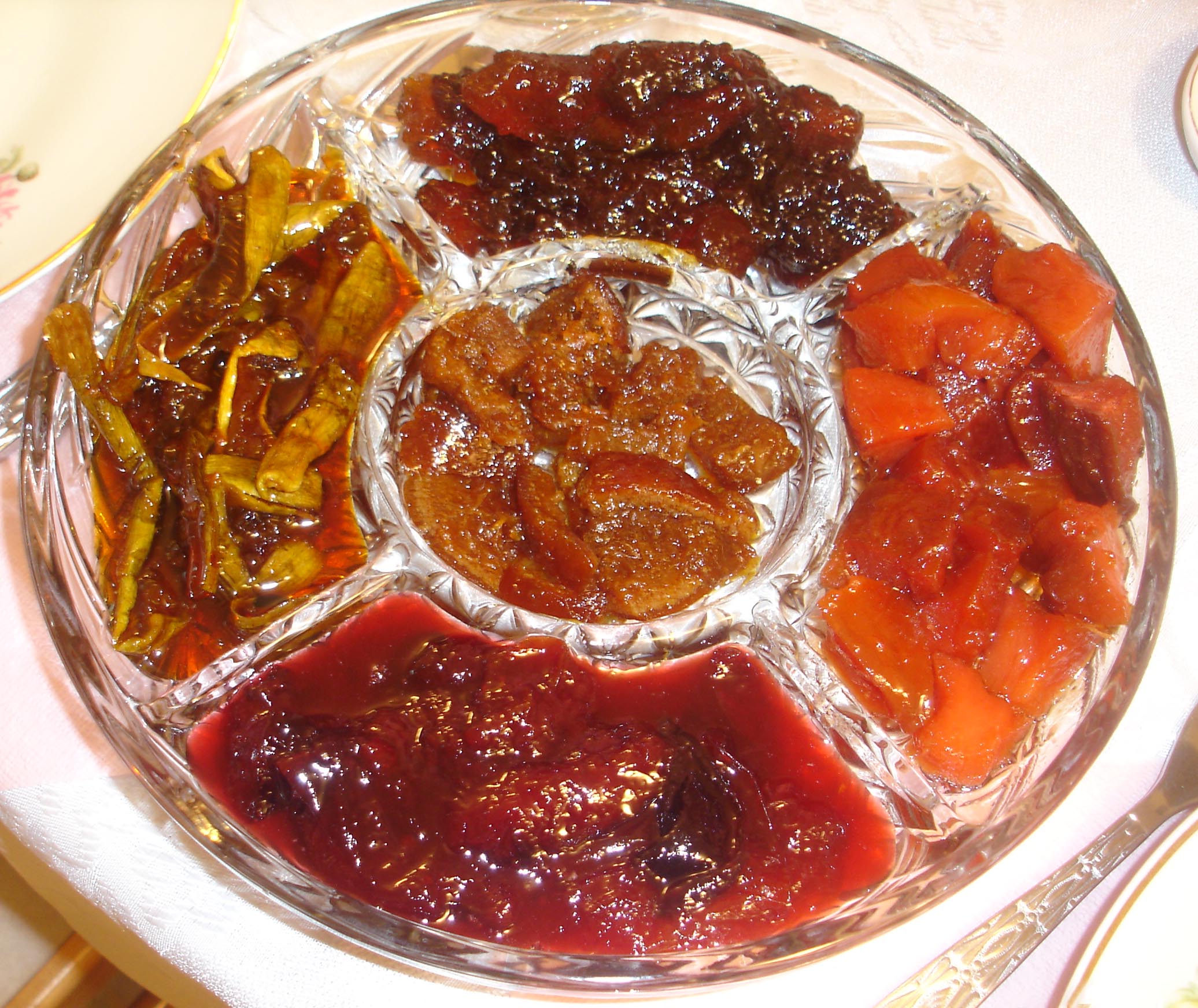|
Conserve (other)
{{disambiguation ...
Conserve may refer to: * Conserve (condiment), a preserve made from a mixture of fruits or vegetables * Conserve (NGO), an Indian environmental organization * Conserve (publisher), a Dutch publisher * Conserved sequence, a protein or nucleic acid that has remained similar throughout evolution See also * Conservation (other) Conservation is the preservation or efficient use of resources, or the conservation of various quantities under physical laws. Conservation may also refer to: Environment and natural resources * Nature conservation, the protection and managem ... [...More Info...] [...Related Items...] OR: [Wikipedia] [Google] [Baidu] |
Conserve (condiment)
Fruit preserves are preparations of fruits whose main preserving agent is sugar and sometimes acid, often stored in glass jars and used as a condiment or spread. There are many varieties of fruit preserves globally, distinguished by the method of preparation, type of fruit used, and place in a meal. Sweet fruit preserves such as jams, jellies, and marmalades are often eaten at breakfast with bread or as an ingredient of a pastry or dessert, whereas more savory and acidic preserves made from " vegetable fruits" such as tomato, squash or zucchini, are eaten alongside savory foods such as cheese, cold meats, and curries. Techniques There are several techniques of making jam, with or without added water. One factor depends on the natural pectin content of the ingredients. When making jam with low pectin fruits like strawberries either high pectin fruit like orange can be added, or additional pectin in the form of pectin powder, citric acid or citrus peels. Often the fruit will b ... [...More Info...] [...Related Items...] OR: [Wikipedia] [Google] [Baidu] |
Conserve (NGO)
Conserve is a non-governmental organization (NGO) launched in India in 1998 by husband and wife Shalabh and Anita Ahuja. Inception In 1998, when the Delhi government launched the Bhagidari campaign, asking its citizens to participate in civic initiatives, the conservationist, Anita Ahuja and her IIT-alumna husband Shalabh rose to the challenge and launched Conserve. With a seed grant from the United States Agency for International Development (USAID), the duo began advocating waste management through seminars and workshops. Conserve started in the living room of some of Anita Ahuja's friends who were taking up issues like sewage and garbage. In synergy with the local Resident Welfare Associations (RWA), the Ahujas would also collect the waste of several colonies in a park and then segregate it. Wet kitchen waste would be converted into compost while dry refuse like polythene bags would be put aside. That project didn't quite work but led her to the idea of doing something about ... [...More Info...] [...Related Items...] OR: [Wikipedia] [Google] [Baidu] |
Conserve (publisher)
Singel Uitgeverijen is a major Dutch publishing group, headquartered in Amsterdam. Its subsidiaries are Nijgh & Van Ditmar, , De Arbeiderspers, Athenaeum, Polak & Van Gennep, De Geus, and Volt. Conserve Conserve, a former publishing house that merged into Singel on 1 January 2019, is now an imprint. Conserve books are published as De Geus-Conserve or Volt-Conserve. Conserve (Dutch: "Uitgeverij Conserve") was established as a Dutch publishing organization in 1983 in Schoorl by Kees de Bakker. The company specialised in publishing historical novels. Cynthia McLeod was one of the authors published by Conserve. Publications include ''Lord of Formosa ''Lord of Formosa'' ( nl, Formosa voorgoed verloren; historische roman over de VOC op Taiwan; "Formosa lost forever; historical novel about the Dutch East India Company in Taiwan") is a 2018 English-language historical novel by Dutch author Joyce B ...''. Brave New Books Brave New Books is Singel's platform for self-publication, in collabo ... [...More Info...] [...Related Items...] OR: [Wikipedia] [Google] [Baidu] |
Conserved Sequence
In evolutionary biology, conserved sequences are identical or similar sequences in nucleic acids ( DNA and RNA) or proteins across species ( orthologous sequences), or within a genome ( paralogous sequences), or between donor and receptor taxa ( xenologous sequences). Conservation indicates that a sequence has been maintained by natural selection. A highly conserved sequence is one that has remained relatively unchanged far back up the phylogenetic tree, and hence far back in geological time. Examples of highly conserved sequences include the RNA components of ribosomes present in all domains of life, the homeobox sequences widespread amongst Eukaryotes, and the tmRNA in Bacteria. The study of sequence conservation overlaps with the fields of genomics, proteomics, evolutionary biology, phylogenetics, bioinformatics and mathematics. History The discovery of the role of DNA in heredity, and observations by Frederick Sanger of variation between animal insulins in 1949, promp ... [...More Info...] [...Related Items...] OR: [Wikipedia] [Google] [Baidu] |

